#colonial neighbours
Explore tagged Tumblr posts
Text
hot spots aren't naturally occurring they're actually the reason cybertronians are classified by most intergalactic governments as an invasive species. they're known for finding a warm energon rich planet and laying their nasty spark eggs all over the place. lots of planets with energon deposits on their moons or the planet itself take many safety precautions to ensure a cybertronian doesn't reproduce on it because everyone knows that they get territorial when someone tries to destroy their eggs. and very few civilizations are in the mood to constantly go to war with cybertronians. often times it's best to remove the conditions for cybertronian breeding by mining and storing the abundant energon before a cybertronian ship finds it.
#also cybertronian colonies are just the biggest most thriving hot spots that developed all on their own#if you do not want that to happen to your planet or your moon or a neighbouring planet#make sure to strip the appropriate celestial body of its ideal cybertronian breeding conditions#valveplug#eggpreg
94 notes
·
View notes
Text
what? I can't talk about the US, but please don't dismiss the farmer protests in europe without informing yourself. do you seriously think "rich plantation owners" go out onto the street to protest? there do exist industrial farms in europe, but these people are lobbying in the government. the farmers protesting outside do so against low food prices and stricter regulations that would hurt their harvest, which would mean death for many small farms as they are already severly struggling money wise. in spain, the protests went against import fought for a focus on local production.
farming in europe is generally looked down upon, small farming is payed very very badly even though grocery prices keep rising, at least in my country farmer is one of the jobs with the highest death rate, particularly suicide. Europe (and everywhere else) desperately need measures to support small, local farming and discourage industrial production – acting like all farming is corporate hurts the cause and it gives you an excuse to not pay attention to what's actually happening and who you're really buying from.
It is so disingenuous when supermarkets have "grown by: Farmer X" on their packaging because it's like, I'll be looking at a pack of strawberries grown by farmer x and he'll actually be the managing director of a fruit farm that employs 2,000 people as pickers!
#sorry i gave my best not to get mad but i'm actually mad. my dad and my grandfathers and all my ancestors did not work their whole life#keeping a farm alive with 0 employees and putting their fucking soul in – while getting payed so badly that they could barely survive#just for you to complain about farmers going to the streets asking for more money. yes small farms should get more money!!#the prices of milk when selling to factories and grocery stores in my country is literally lower than the prices of water. its that bad.#of course small farms then need government money otherwise their gonna die off (which is already happening anyway)#the notes on this post are sickening just stop have u guys (europeans) ever met a real farmer (NOT a ceo of an industrialized piece of land#in your lifes?!#my childhood neighbours did not kill themselves because their farms and lives had no future anymore just for you to say there are no farmer#who care#there are ACTUAL interesting and important critiques to industrial farming and the colonialism of farming and even the keeping of animals#that you can make without dismissing many peoples struggles and livelihoods#ok sorry. but really. bye
4K notes
·
View notes
Text
I think it's very revealing that Apartheid South Africa's great project, their ultimate solution to the problems of Apartheid, was the Bantustan Policy. Because by giving the black population their own "Independent Homelands", the South African settlers were trying to establish the same relationship with Africans that the USA has with Latin America and Western Europe has with North Africa and West Asia. It was a plan to eliminate the problems of second class citizenship by removing their citizenship altogether, turning "black" labour into "migrant" labour.
Like South Africa already used an extensive amount of actual migrant labour from neighbouring colonies and nations, but the bedrock of South Africa's economy was cheap heavily exploited local labour; the maintenance of this relationship was the primary reason Apartheid as a system even emerged in the first place. As Apartheid began to crack apart from both internal and external pressure, attempts were made to change the system while still maintaining the fundamental basis of exploitation. And migrant workers from impoverished colonised nations can be every bit as exploitable, but without all the unpleasant international backlash. So they attempted to shift the policy of separation within a nation to separation between nations. It wasn't enough to save open White supremacy in South Africa, but it's still working very well for the nations who inspired it
Apartheid and Segregation are tremendous evils in the eyes of all but the most reactionary Liberals, but "Border Control" is perfectly acceptable. All the same atrocities could be committed, all the same wealth stolen from exploited lands and exploited peoples, but in a much more internationally "normal" manner. As far as most Liberals are concerned "Citizens" have rights that should never be violated but "Foreigners" are lucky to get privileges, even when the only difference between the two are a few lines they drew onto a map. Oppression is good as long as its sufficiently externalised, happening in the places and to the people that you're not meant to care about. The same systems behind Apartheid are still very much alive all over the world, just under more "acceptable" pretenses. A simple change of aesthetic is all your average liberal needs to be comfortable
1K notes
·
View notes
Text
Israel bombed the building next to the Iranian embassy in Syria a few days ago. That building was said to house embassy workers. Iran promised to seek punishment for what is being called an act of war.

Since then, there have been a couple of incidents.







No one knows what will happen (aka ignore anyone saying 'in 48 hours Iran will...') or how big the Iranian response will be. All I know is that the Israeli colonial state cannot expect to attack Palestinians and their neighbouring countries (Lebanon, Syria, Iran) with impunity and survive for much longer.
#yemen#jerusalem#tel aviv#current events#palestine#free palestine#gaza#free gaza#news on gaza#palestine news#news update#war news#war on gaza#iran#syria#axis of resistance#end the occupation#edited
2K notes
·
View notes
Text
"The Congo’s strategic location in the middle of Africa and its fabulous natural endowment of minerals and other resources have since 1884 ensured that it would serve as a theatre for the playing out of the economic and strategic interests of outsiders: the colonial powers during the scramble for Africa; the superpowers during the Cold War; and neighbouring African states in the post-Cold War era. To prevent a direct confrontation between the United States and the Soviet Union, the Security Council deployed from 1960 to 1964 what was then the largest and most ambitious operation ever undertaken by the UN, with nearly 20,000 troops at its peak strength plus a large contingent of civilian personnel for nation-building tasks.
This latter aspect of the Opération des Nations unies au Congo (ONUC) was a function of the fragile political revolution ... The Congo won its independence from Belgium on 30 June 1960. Patrice Lumumba’s MNC-L and its coalition of radical nationalist parties had captured a majority of seats in the lower house of parliament in the pre-independence elections in May. Lumumba became prime minister and head of government, while the Abako leader Joseph Kasa-Vubu became the ceremonial head of state. The victory of a militantly nationalist leader with a strong national constituency was viewed as a major impediment to the Belgian neocolonialist strategy and a threat to the global interests of the Western alliance.
Within two weeks of the proclamation of independence, Prime Minister Lumumba was faced with both a nationwide mutiny by the army and a secessionist movement in the province of Katanga bankrolled by Western mining interests. Both revolts were instigated by the Belgians, who also intervened militarily on 10 July, a day before the Katanga secession was announced. In the hopes of obtaining the evacuation of Belgian troops and white mercenaries, and thus ending the Katanga secession, Lumumba made a successful appeal to the UN Security Council to send a UN peacekeeping force to the Congo. However, the UN secretary-general, Dag Hammarskjöld, interpreted the UN mandate in accordance with Western neocolonialist interests and the US Cold War imperative of preventing Soviet expansion in the Third World. This led to a bitter dispute between Lumumba and Hammarskjöld, which resulted in the US- and Belgian-led initiative to assassinate the first and democratically elected prime minister of the Congo.
... Brussels’ failure to prevent a radical nationalist such as Lumumba from becoming prime minister created a crisis for the imperialist countries, which were determined to have a decolonization favourable to their economic and strategic interests with the help of more conservative African leaders. With Belgium’s failure to transfer power in an orderly fashion to a well-groomed moderate leadership group that could be expected to advance Western interests in Central and Southern Africa, the crisis of decolonization in the Congo required US and UN interventions. Working hand in hand, Washington, New York and Brussels succeeded in eliminating Lumumba and his radical followers from the political scene."
Georges Nzongola-Ntalaja, The Congo from Leopold to Kabila: A People's History, 2002
425 notes
·
View notes
Text
Once upon a time there was an Entity, that saw humans for the first time and decided to want one of its own. Gathering together tools, fruit trees, running water, songbirds, sunshine and shade, the Entity created a little container that had everything a human could possibly want and need, and then gently picked one up, and placed her in the enclosure.
"There", the Entity said, "you are mine now, and I have put you here where you have everything you want, because I love you so much. Are you happy?"
"No", the human said, "for I miss my mother and father, and I miss my sister and her children, and I cannot be happy without them." The Entity listened and left, heading back to where it took the human in order to find her kin.
"There", the Entity said, "I have brought your family together, so you are no longer apart. Are you happy now?"
"No", the human said, "for my sister's children miss their father, and my sister misses her too, and none of us can be happy if they are unhappy." The Entity listened and left, heading back to where it toook the humans in order to find the one it neglected to take.
"There", the Entity said as it put down the one last missing human, whose children ran to meet him, crying and laughing from relief. The Entity addressed them all. "Now you have all your family. Are you happy now?"
"No", the humans said, "for my mother misses the neighbours she gossips with, my father misses the friends with whom he played cards, the children miss their playmates, and..." This time the Entity did not even listen to the end, but left back to the place where it had found the humans, and gently scooped up every single human in the city, bringing them to their new beautiful little enclosure.
"There", the Entity said, addressing the whole colony it had gathered into this beautiful paradise that it had made especially for them. "I have now brought all of you together, so none of you are apart. Are you happy now?"
"No", the humans said, "for we miss our beautiful homes, we miss our familiar streets. We miss the fountains and statues and the calls of city birds, and we cannot be happy if we can never go back home again."
So the Entity left, went back to the city that was now empty, carefully picked up the whole thing, and moved it to the enclosure, careful to not alter a single detail, and put everything as it should be. "There", it then said to the humans, "now your homes are here, too. Are you happy now?"
"No", the humans said, "for-"
The Entity sighed in frustration, and began unbraiding the weaves of time, undoing the past several days so that none of this had ever happened, as a creature that wants and yearns so much is simply too much trouble to own.
1K notes
·
View notes
Text

A fic rec of One Direction fics that take place in a small town, rural area as requested in this ask. If you enjoy the fics, please leave kudos and comments for the writers! You can find my other recs here. Happy reading!
- Louis / Harry -
🏡 I'll Fly Away by @juliusschmidt
(E, 122k, childhood friends) Harry and Louis grew up together in Lake County, Harry with his mom and stepdad in a tiny cottage on Edward’s Lake and Louis in his family’s farmhouse a few minutes down the road. But after high school, Louis stuck around and Harry did not
🏡 Tired Tired Sea by MediaWhore / @mediawhorefics
(M, 113k, lighthouse) As a B&B owner on the most remote of all the British Isles, Louis Tomlinson is used to spending the coldest half of the year in complete isolation, with his dog and the sea as sole companions. Until, one day, a mysterious stranger on a quest to rebuild himself rents a room for the winter.
🏡 Black with Autumn Rain by whimsicule / @baroness-elsa
(T, 93k, magical realism) Harry is a journalist, Louis has lots of secrets and the moors aren't exactly the ideal place to rekindle a lost romance.
🏡 Here In The Afterglow by fondleeds
(NR, 88k, historical) 1970’s AU. In a tiny town in Idaho, Louis’ life is changed forever by the arrival of a curious stranger.
🏡 ocean tides you home (series) by @justanothershadeofblue
(M, 88k, Eroda) Harry is a lonely and depressed popstar who sailed out of his hometown on Eroda years ago to chase his dreams. He comes back to the island only to find his shining childhood best friend Louis just as cold and dreary as the island they grew up on.
🏡 Into the Weeds by kair0sclerosis
(M, 87k, secrets) Following the whispered words of a stranger, Harry Styles finds himself in the small town of Peri Ridge. It’s a town nestled within overgrown forests, raging rivers, and ominous mountains- full of unkept secrets, the aura of freedom, and lost people seeking to be found.
🏡 (Take Me Home) Country Roads by Awriterwrites / @a-writerwrites
(E, 86k, Northern Exposure au) Louis as the big city doctor, Harry as a natural healer, Niall as a secretive barkeep, Liam and Zayn head over heels for each other but they don't know it and a lot of hurt, comfort and moonshine in between.
🏡 Full Moon Dreaming by jacaranda_bloom / @jacaranda-bloom
(E, 43k, soulmates) Louis has given up hope of dreaming of a person, resigned to living a life devoid of that kind of all-consuming love for another and receiving the same in return. But when a new neighbour descends on Louis’ beloved Hanson Bay and moves into the other beach house, could all that be about to change?
🏡 The Things We Know To Be Wild by harryanthus_annuus / @harryanthus-annuus
(M, 39k, HTTYD au) Louis is a London zoologist sent by the University of Highlands and Islands to assess the safety of the island of Eroda as part of the Wonder Seekers Project for sustainable tourism.
🏡 Something About Liminal Spaces by @kingsofeverything
(E, 34k, age difference) Searching for inspiration for his latest book, and hoping distance will help heal his broken heart, Louis Tomlinson heads to the village of Piha on the west coast of New Zealand’s north island.
🏡 It's the Climb by @lululawrence
(NR, 25k, Hannah Montana au) Louis is a world famous punk rock singer with a stage name of William and Jay drags him back to Tennessee for the summer.
🏡 It's Coming on Christmas by QuickedWeen / @becomeawendybird
(G, 23k, girl direction) When Harry Styles gets a call from the caretaker of a bakery in a small town in Vermont, she jumps at the chance to get out of Boston and run her own shop.
🏡 Naked & Proud by kiwikero / @icanhazzalou
(E, 18k, songwriter Louis) In which Harry runs an organic store, not a nudist colony, and Louis doesn't know whether to be relieved or disappointed.
🏡 Between the forest and the field by bluegreenish / @greenblueish
(E, 16k, meet cute) the one where Harry recently moved to a village and his shy dog picks Louis' dogs to play with at the dog park. A fluffy cottage core AU.
🏡 Won’t Let You Down by noellehenry / @noellehenry-original
(M, 15k, inheritance) In a matter of weeks, Harry’s world turns upside down. Suddenly he’s the owner of a farm and B&B, gets involved in illegal trading of unlabeled bottles and has to deal with his everlasting crush on his sister Gemma’s best friend, who has returned to Woodville…
🏡 You Tilted My Hand by @taggiecb
(G, 12k, photographer Harry) Harry Styles arrives in Avonlea, Prince Edward Island for his first day of a coveted and prestigious summer internship at the Avonlea Chronicle. He's quick to realise that he's out of place in the little band of journalists as he's an art major and they didn't choose Harry to be part of the team!
🏡 Babe, There's Something Lonesome About You by patdkitten / @babyarcanacasey
(M, 8k, witch Louis) Louis is a hedge witch, who lives a lonely, solitary life. He's quite happy with his shop in Door County, selling New Age magics to the tourists.
🏡 Warm Chilling by Larry_you_know / @larryyouknow
(G, 7k, neighbors) Louis moves into a cosy cottage in the English countryside with his dog Clifford to look after his great-aunt's animals.
- Rare Pairs -
🏡 Grundy County Incidents (series) by @haztobegood
(T, 10k, Harry/Louis/Nick Grimshaw & Zayn/Liam & Niall/Greg James) 25 years, 7 friends, 3 relationships, 1 rural county
🏡 Something Good (And I Don't Just Mean Your Chips) by sunsetmog / @magicalrocketships
(T, 9k, Harry/Nick Grimshaw) Nick's uncle's will left his seaside cottage, his fishing boat, and all the contents of both to Nick. Coming off the back of months of very poor life choices, a brand new start in a Yorkshire seaside village seems the last remaining option for Nick
#weekly recs#small town#rural#1dsquad#1dficvillage#hltracks#hljournal#hlcreators#ficrec#1dficlibrary
184 notes
·
View notes
Text
Straight Out of the Colonial Playbook:
The Myth of Untouched Lands
The Jewish National Fund (JNF) is an organisation with charity status all across the world. Many people know them as the people who use their little blue boxes to collect money to plant trees. They seem to be doing well to reach their goals, having planted over 250 million trees since 1901. All this seems pretty innocuous, perhaps even noble. After all, the idea of planting trees seems quite divorced from violent settler colonialism.

ID: A large slice of watermelon. You can see the Red of the flesh, the black of the seeds, and the white and green of the rind. It is set against a light teal background, a colour that may invoke peace and calm, much like a free Palestine would.
But the two have long, intertwined histories. Just look to the National Parks of the US, used to grab land from Native Americans with the justification that they were "uninhabited". Colonisation of the Arabian peninsula was partially justified with the argument that native Arabs had degraded the environment to the point of desertification, and colonial rule was the only way they could be saved from themselves [1]. Unsurprisingly, most of the ecological damage in that region had been done by the colonialists themselves in the pursuit of resources.
The JNF isn't just some minor organisation that has unfortunate ties to questionable powers. Though they shroud themselves in the soft words of environmentalism, they currently stand as one of the primary tools of violence for Zionism.
Established in 1901 by the 5th Zionist Congress in Basel, Switzerland, they have always been an organisation with settler colonial intentions. In 1940, their leader Yosef Weitz, said “There is no way but to transfer the Arabs from [Palestine] to the neighbouring countries, to transfer all of them… not one village must be left… for this goal funds will be found." [2]. You know what happened to him after the first Nakba? He became the head of the JNF's forestry department [3].
According to their own website, they currently stand as the "single largest provider of Zionist programs in the U.S." [4]. They also own about 13% of all state lands in Israel [5]. They have been both a major driver, and unsurprisingly, benefactor from the ongoing Nakba of the Palestinian people.
So how exactly does planting trees feed into settler colonialism? The model works like this:
The Israeli government violently displaces people from their lands in the name of "self-defence".
The land becomes "uninhabited".
The JNF uses funds they have accrued from overseas donations to buy up the land.
They establish a national park in the area and begin to plant trees.
Settlers move into the surrounding regions. The JNF have a policy of not leasing land or accommodation to non-Jewish people [5].
Any remigration of indigenous people back into those lands is framed as "environmental destruction" and those people are forced out once more.
You know what's sneaky? They are using trees as bodies. They don’t have enough people to colonise all the land they've stolen, so they plant trees to occupy the spaces that human bodies cannot. They deliberately use fast growing trees like pines to aid in this pursuit [3]. Each forest acts as an occupying force, just one that uses seeds instead of bullets and trees instead of soldiers.
Most of their efforts are concentrated on Naqab (Negev in Hebrew), a region in the south of Israel mostly consisting of desert. On their website, the JNF boast of their Blueprint Negev initiative, and how it's "transformed Israel’s Negev Desert, making the Southern Israel an attractive place to live and work" [4]. Their mission statement in the Naqab includes the justification that they are providing homes, jobs and opportunities in the "empty" region [6]. One of the slogans have on their website is "Building the Negev, town by town"[6]. This is explicitly a settler colonial project, and all of it can be found on JNF website, in their own words.
And to top it all off, you guessed it, the Naqab is far from uninhabited. It was never empty land. In August 2018, 350 villagers from Umm al-Hiran were displaced to the state-regulated Bedouin township, Hura to accommodate the expansion of the Beit Yatir settlement in the Yatir forest, which was planted by the JNF [5]. In 2010, Nuri-al-Uqbi presented evidence that his ancestors had owned and lived in the lands of al-Araqib since before the Israeli occupation to the courts. In 2010, a Beersheva judge rejected the case, siding with the government's claims that his tribe had no ownership claims on the land [7]. The indigenous peoples of Palestine are constantly disenfranchised, displaced, and have very little means of winning their land back within an Apartheid legal system.
The JNF are using strategies employed by colonial powers in the past to violently seize land from native peoples. Acting under the guise of environmentalism "launders" the colonisation, adding extra steps in between the expulsion of people from their homes and the eventual settlement of that land by colonists, with the added bonus of making the JNF look very good. And you know what? Their reforestation schemes suck. Fast growing, new growth forests in the DESERT are not a substitute for old growth forests, not to mention the enormous amount of water they must be using to keep these forests as, well, forests.
What boils my blood the most is that you can see them honouring their colonial inspirations and sponsors in how they name their parks. Britannia park in the Hebron district obviously takes its name from Britain, a country instrumental in the establishment of the Israeli state and the Nakba that has ensued. Fittingly, it sits upon the ruins of seven Palestinian villages, destroyed by Israel during the first Nakba [8].
And this isn't just stuff that has happened in the past, but is happening right now. JNF UK is currently receiving donations to plant a memorial forest "to commemorate those who were brutally murdered on October 7." For £100, you can plant one tree. For £250, you can contribute to an outdoor seating area for group events. For £36, you can pay for an irrigation system that will provide enough water for one tree for four years [9]. Doesn't it make you angry? 36,000+ Palestinians have been murdered, and the JNF are collecting money to water trees on their graves.
I hate it when scientists stay neutral. We and our work are not divorced from the world around us. Conservation means nothing if it comes at the cost of human lives; it means nothing if it is used to veil the atrocities of colonialism and apartheid. It is our duty as conservationists, and as human beings to hear those whose voices carry cries for help, and answer the call. Do not be won over by the siren song of green colonialism.
Free Palestine. May all empires fall.
Bibliography
[1] Skandrani, Z., Decolonizing ecological research. Journal of Environmental Studies and Sciences, 2018. 8(3): p. 368-370.
[2] Stop the JNF, The JNF, Apartheid and Settler Colonialism. (Spring 2024). https://www.stopthejnf.org/the-jnf-apartheid-and-settler-colonialism-spring-2024/
[3] Stop the JNF, Tower and Stockades, Forests and Jim Crow Vetting Commitees. https://www.stopthejnf.org/jnfs-sordid-history-tower-and-stockades-forests-and-jim-crow-vetting-committees-by-jonathan-cook/
[4] Jewish National Fund, We are JNF. https://www.jnf.org/menu-3/about-jnf
[5] Amnesty International, ISRAEL: APARTHEID IN ACTION. Amnesty international: submission to the 43rd session of the UPR working group, 9 May 2023.
[6] Jewish National Fund UK, Homepage, https://www.jnf.co.uk/
[7] Jonathan Cook, Bedouins defiant despite Israel eviction plan. https://www.jonathan-cook.net/2014-06-14/bedouins-defiant-despite-israel-eviction-plan/
[8] Palestine Land Society, Britannia Park - Burial and Treachery. https://www.plands.org/en/articles-speeches/articles/2022/britannia-park-burial-and-treachery
[9] Jewish National Fund UK, Green Sunday 2024 – Memorial Forest. https://israelunderattack.jnf.co.uk/projects/green-sunday-2024-memorial-forest/
336 notes
·
View notes
Text
more for your consideration:
the phrase "The Great Lakes" now refers to the African great lakes in the East African Rift Valley (which include Lake Victoria, Lake Tanganyika, Lake Malawi, Lake Albert, Lake Turkana...)
the "Plegde of Allegiance" now refers to the Pledge of Allegiance to the flag of the Philippines
the "dollar" with no additional clarification refers to the currency of Brunei
We've had enough of the English-speaking internet defaulting to USAmerican terms that we are all forced to learn against our will. Here are the new default settings:
"Southern" no longer means Texas. It now refers to the Philippine island of Mindanao.
"The Midwest" is now Harare, Zimbabwe.
The default legal system is now that of the devolved administration of Scotland.
"College" is an educational institution for 13 to 18 year olds, as in some parts of New Zealand.
The "president" is that of Guyana, currently Irfaan Ali.
If you use these terms to refer to something in the USA then you have to specify or else we won't know what you're talking about and you'll sound like an idiot. Thanks!
#home and neighbouring lands#the great lakes one is actually something i feel very strongly about ok#bc the East African Rift Valley lakes are fucking INCREDIBLE#nobody asked but#those three lakes contain more water collectively than all the North American great lakes#Lake Victoria (great lake but terrible names thanks British colonisers) is the second largest freshwater lake in the world and is split#between Tanzania Kenya and Uganda#and is the source of the longest bit of the Nile? idk I'm not an expert it's complicated#Lake Tanganyika (better name) has a wild variety of crustaceans#Lake Turkana is the world's largest alkaline lake#and where several hominid fossils were found#Lake Malawi (which I grew up calling Lake Nyasa) is home to more species of fish than any lake in the world???#I didn't know that one every day is a learning day#Lake Natron (which is not on Wikipedia's list of East African Rift Valley lakes but is Very Definitely in the E African Rift Valley...#... and does show up on some lists but like I'm not an expert)#is RED and the only area in E Africa where flamingoes breed#also just to further my point re colonialism#in the list of Great Lakes: we have a Lake Victoria Albert and Edward#& several more that were originally named after high ranking Westerners#eg Lake Turkana was named when the Europeans arrived after an Austrian Prince and got renamed Lake Turkana after independence#anyway yes this may have been a ruse to talk about the East African Great Lakes#i ramble in the tags
10K notes
·
View notes
Text
Some 19th century rusameamerus hcs!! (゜o゜;) and a little comic (◕ᴗ◕✿)
Today, I will skip over the entire revolutionary war+whatever happened in the world in 1812, and we are nearing the 1820s. Um, no, actually over 1825... Cause in 1822 there is Monroe's doctrine with the whole "you don't mess with my stuff, I don't mess with yours,” a hands-off policy in South America, as a reaction to plans of the Holy Alliance (Austria, Prussia, Russia) to discuss matters at the Congress of Verona on the Spanish question. Like they wanted to restore Spanish rule over Latin American colonies that had declared their independence. AnOpinions of the former 13 colonies were not asked. The USA might have plans for LatAme, how could they??????!!!!!
Okay, I'll stop with the historical stuff. I got sidetracked. Sometimes I start to act like Philomena Cunk…

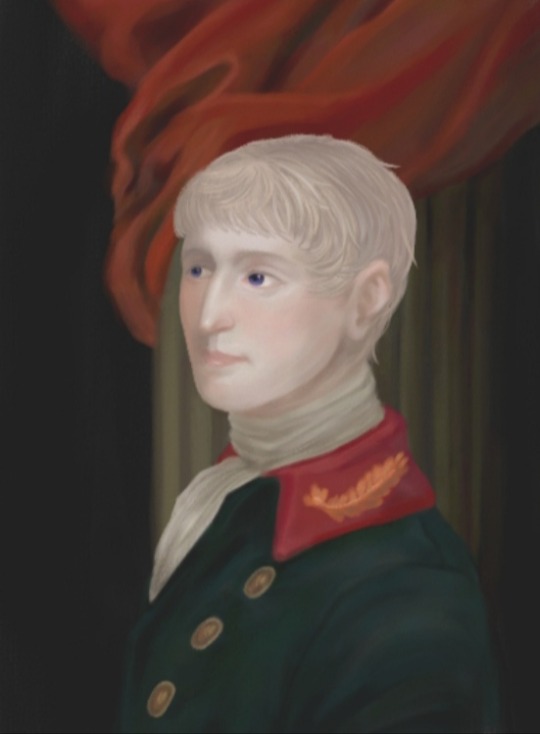
The portraits are in the appropriate style of grand manner for 18/19 century. Highly referenced Joshua Reynolds. They're unfinished cause I got bored. Sorry! (˘・_・˘)
Anywho
Al and Ivan knew each other in the first half of the 19th century. They met and interacted; some points of friendship were gained. This is established, at least in my interpretation. After many times of proving his independence, Alfred is still being isolated by the Old World. Like they're aware of his existence and literally don't give a fuck about it. Many other things are happening on the continent; no time for new acquaintances. However, America wants to be included and to have friends!! So he is still stuck with his "sort of not fully an ally in independence war cause yknow we don't want the british to consider us as enemies too, so here are two ships if the shit hits the fan - use them" Ivan. A close neighbour from the north who started doing... something? in the icy part of the land (expansion, colonial adventure in Alaska). A BIG imperial monarchy with a good position in the Concert of Europe. Someone who probably knows a lot about diplomacy and other things on how to exist as a whole country. On the other hand, Russia isn't reluctant to have a nosy and too energetic creature around; of course, he is excited about a new friend. They see benefits in each other—"the whole world will open for me/I won't feel so lonely with him". Almost compatible with problems. This was probably curiosity at first sight. Major "why is that with him this way and not the other?" factor.
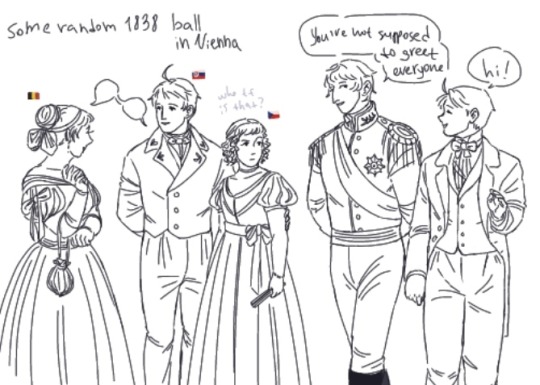
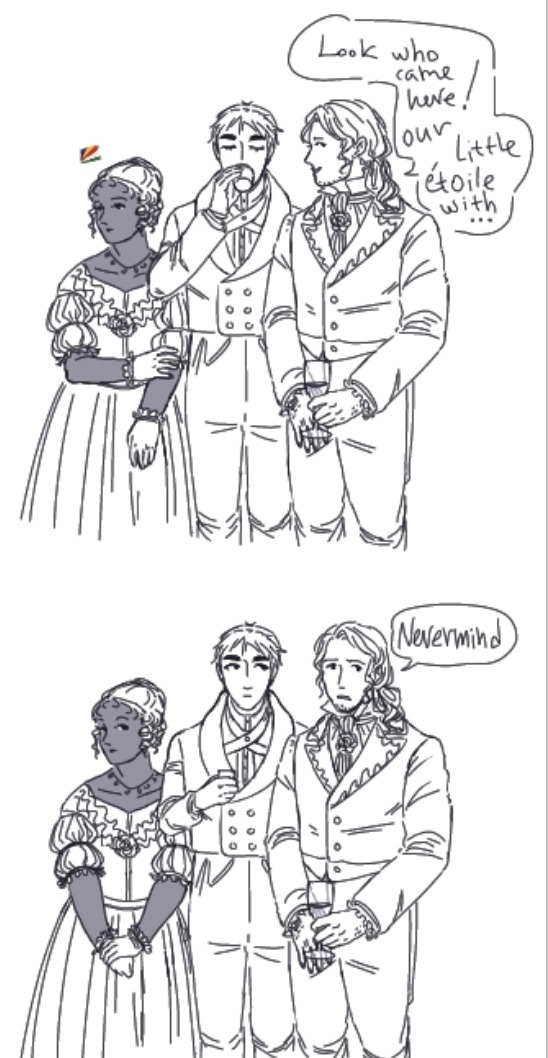
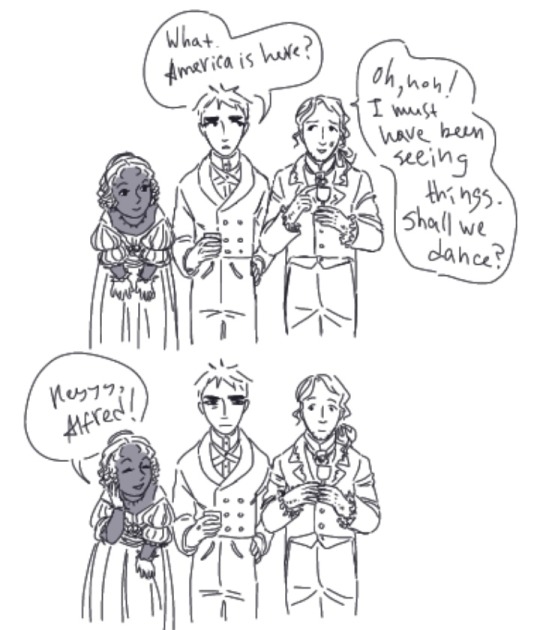
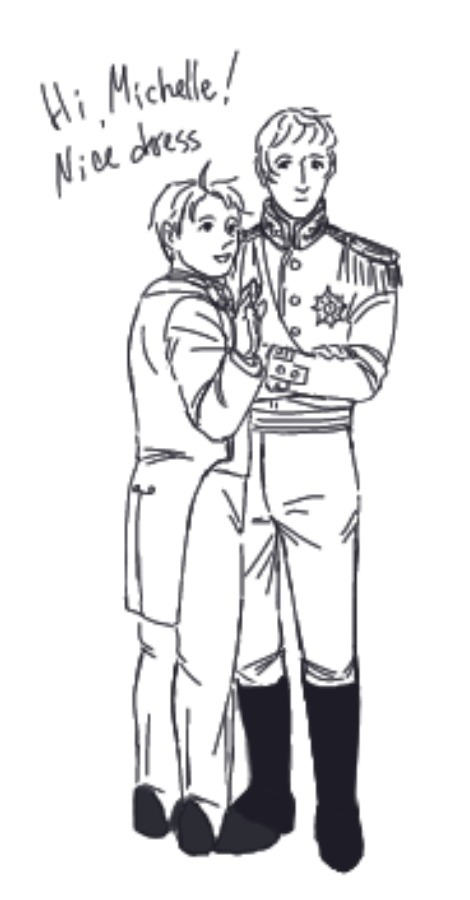
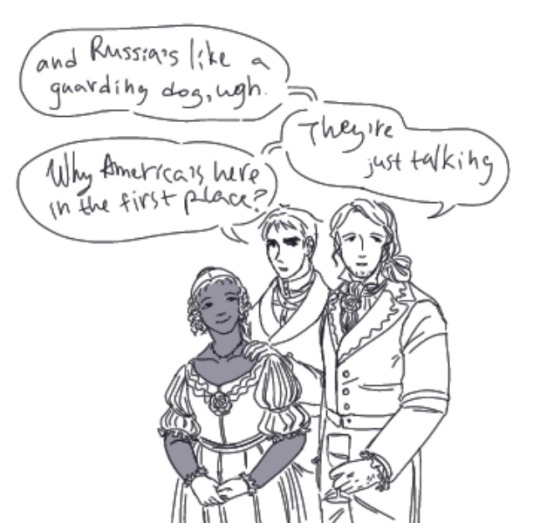
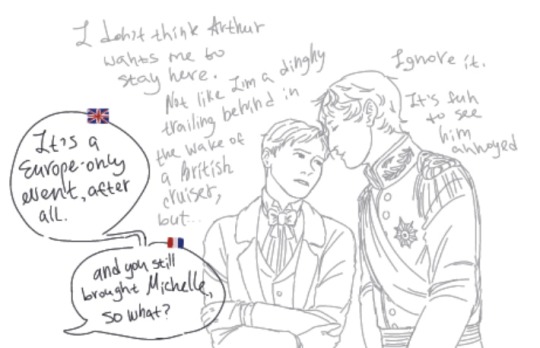
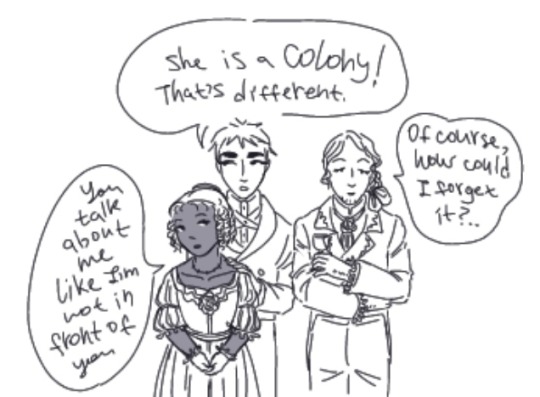
A hot new bombshell has entered the villa
The next bit might come across as too metaphorical and OOC. You've been warned.
Ivan sees Alfred (at least until the 1850s) as too nice, too innocent, and an overall pure being. A boy is so full of wonder and love for everything that it feels almost impossible. Ivan doesn't want that to change and is actually afraid of it happening, he tries to hold back Alfred from seeing the other harsh side of reality; nevertheless, Al wants to experience all - dirt, bliss, the world as whole. He doesn't want to be brought back to life, isolated from others.
After the 1850s, the situation changed. Ivan really appreciated Alfred's benevolent neutrality with the mess the Crimean War was; there is no secret in that. As a way of showing gratitude for it, he started inviting Alfred more frequently to his place. For tea, for hunts or even without a proper reason [yeah, it takes like a month to sail from one continent to another, inconvenient!]. And Alfred crushed. Real hard (regular oh, italicized oh). No other nation was treating him like that—"humanly". Everyone wanted something from him and wished for him to somehow change in a direction that was more beneficial for them. For Ivan, Alfred, as he was, was more than enough. America knew that he appreciated Ivan way before, but didn't give much thought to his feelings. He was capable of some sort of controlling it. However, now [as in the second half of the 19th century] Alfred cannot. He sighs too loud, looks too long, and smiles too much. Everything feels too much for him to handle. He tries to distract himself and pays attention to making new friends (cough the opening of Japan in 1853-1855 cough), but is still drawn to Ivan. However, the latter doesn't understand why America is suddenly more jumpy, more uneasy with him, and why his laughs are more strained. Although Alfred insists that everything is just peachy (he doesn't want to ruin this friendship with his weird feelings), Ivan's suspicion grows. He wants to know why but can't come up with a solution.
Their already interesting liaison transforms into more confusion.
And I consider hetamyu canon (cause musicals fill in all the missing plot points in manga, for me at least), sooo according to the second one, there was something peculiar between them (the infamous kiss scene).
Although I headcanon, at least for half of the 19th century, their friendship was childlike and mostly naïve. Ivan and Alfred are tall kids in diff ways. And I can absolutely imagine them playing tag or hide and seek. Though, this could have happened in any century.
In 1861-1865 they couldn't physically see each other (Alfred had to crawl in trenches), so their usual correspondence intensified (that sort of "absolutely not gay in any way" messages, like "my heart aches at the thought of your suffering, my dearest friend")...
Except for the late autumn of 1863 [the visit of the Russian fleet during the fall-winter of 1863-1864*]. Ivan paid for the first time in a while for a visit to New York (I like to think that Alfred stayed a lot of times in Saint Petersburg; however, Ivan wasn't that fond of travelling). Alfred was tired and pretty much beaten from fighting with himself; however, some obsessed excitement brought back his optimism for one night. At the ball they, as expected, danced a bit, and escaped to a more enclosed space from people and noise. Not much talking happened there; soothing silence at that time was needed. Of course Alfred was stressed because your own family literally wants to dismember you (don't know if I need to put a historical reference, but still—at the outset of the war, England and France supported the South. Napoleon III, with colonial designs on Mexico [Second Franco-Mexican War, 1861-1867], looked longingly on a divided United States, and British shipping interests were seriously affected by Lincoln's blockade of southern US ports, which led to the recognition of the Confederate states as belligerents. Russia supported the Union).
*I wanted to add here an actual fun historical fact! This “gesture” was interpreted by Americans as sympathetical move and overall a sign of “secret agreement” and Russia's protection of US Government (you can read about it further here: https://www.jstor.org/stable/25156012)
Not long after that, Ivan started viewing Alfred as more mature than he was before (Ame literally got torn apart in the Civil War, of course he boosted in character development).
I'll stop here (◡ ω ◡)
(They were literally bros before hoes....................)
I'll think about making other additions to this long list of headcanons about the start of the 19th century and, of course, the whole selling Alaska event.
For finishing reading this scientific paper-sized post, you'll get old sketches of Al (and Matt!!! Woah!!) in Victorian clothing.
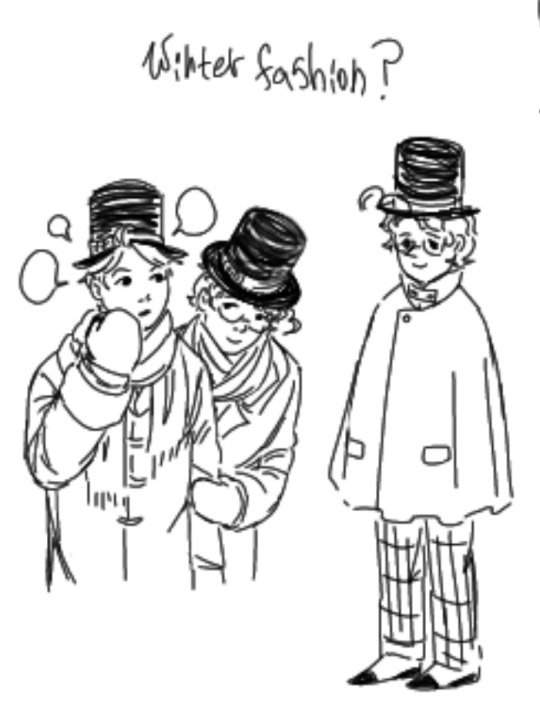
trench coat buttoned to the TOP.
#hetalia#amerus#rusame#hws#aph#hws america#hws russia#aph america#aph russia#i hope you will grow to enjoy my papyrus scrolls#art#headcanon#and i didn't even try to include all historical refs hahah....#you guessed right - 19th century is one of my fav periods#I know the portraits don't look decent but I wasted on them a lot of time so I kind of had to include them#i hate drawing in realism PERIOD it's too much to think my brain is weak#but it speaks to me like the green goblin mask
68 notes
·
View notes
Photo

Wanka Civilization
The Wanka (also Wanca or Huanca) people occupied the highlands of ancient central Peru around Lake Junin and the Manataro, Chanchamayo and Tarma rivers. The culture flourished from the Middle to Late Horizon periods (600 CE - 1532 CE). Dwelling in fortified hill-top settlements, they largely specialised in llama herding. As with other cultures in the area, herding was long-preferred over farming. It was not until c. 1000 CE that intense maize farming began, much later than in other contemporary cultures. This shift in agricultural practice was motivated by changes in settlements and a significant increase in population density. Now concentrated in walled towns, the capital city of the Wanka was established at Wari Willka.
Wanka art and architecture across their different settlements were influenced by the nearby Huari culture and the Ayacucho style. Settlements vary in size with the majority having fewer than 50 buildings but several having over 100. Most buildings were circular and arranged in small groups of up to twelve around an open courtyard. There is not much evidence of town planning, although some settlements were constructed in pairs in close proximity.
The Wanka provided stiff resistance to the Inca Empire until their final defeat at the hands of the great Inca leader Pachacuti (r. 1438 - 1471 CE). The Incas shifted populations to lower-level locations and administered the area from an imperial centre at Jaujatambo. Agriculture became better organised in order to produce quotas for the Inca state and large storage buildings (qollqa) were built.
Never wholly subjugated to Inca rule, the Wanka were often embroiled in border disputes with their neighbours the Xauxa, and the Incas describe the Wanka as being continuously plagued by internal disputes. Nevertheless, they became keen allies of Pizarro in his conquest of the Inca Empire. The Wankas also helped the Spanish Crown put down several rebellions in the early decades of colonial rule in Peru, notably the defeat of Francisco Hernández Girón between 1553 and 1554 CE. Their name lives on today with the Peruvian city and province of Huancayo being named after them, as is the local football team Deportivo Wanka.
Continue reading...
177 notes
·
View notes
Text
What your favourite batfam member (of the ones I know enough about) says about you- a 100% accurate list of logical conclusions that are true about everyone.
(Those are not assumptions, just cold-hard logic based on what is appealing about each of the batfam members.)
> Alfred: One time in a shop, you picked up a holiday decoration, one of those bright red and gold shimmery ornaments they hang on Christmas trees, and it was so simple and beautiful your throat clogged up with grief over something you could not name and you were tempted to crack it open like an egg. You didn't.
> Kate: The other night, you were at the park, and it was that time of the evening where the cold breeze picks up just a little and breathing just a little raw, and there was a woman standing under a street lamp with a long black coat and she was smoking a cigarette and she took a deep breath and exhaled a cloud of smoke and the lamplight went out and you watched the woman disappear.
> Bruce: At the nearest comic store next to you, there's a young woman behind the counter who chews bubblegum and has a pink strip in her hair. She knows every issue you will think of and can navigate the obscure sorting system of the shop in her sleep. Sometimes, on the weekends, there's a little kid in a big scarf that will huddle in a corner of the shop and read comics, and she will not say anything about him, and neither will you.
>Barbara: At your local library, the books are organized along the official system, but you can tell this change was recent, due to the faded book tags on the spines. Very often, people will leave their bookmarks in the books: elegant, woven lace or printed leather ones, painted ones homemade with care and watercolours, practical ones that double as a ruler, thematic ones from books or shows or favourite bands, the ones with the holographic animal pictures... The librarians know this. They leave them in the books like a little treasure hunt.
> Dick: You were a little kid, eating cereal in the morning before your parents were awake, watching cartoons with the volume on low. Your favourite cartoon came up and you hummed the theme song under your breath, careful not to wake anybody up. It was a Saturday, no school today. You were wearing your favourite pyjama.
> Cass: When you were ten years old, you would crouching over a tree root in a corner at recess, watching a little colony of firebugs travel in line out of the tree trunk. You took a little bramble and held it in their way, just to see what would happen, if they would climb on it instead. They walked around it and carried one their way; you didn't insist. Nearby on the ground, you found a beautiful marble.
> Steph: Seven months before you were born, your mother was walking down the street to get some last minute work groceries, when she took a wrong turn and ended up staring at a tv screen from inside a shop, and she couldn't hear the noise but something in the image petrified her, mouth open in awe, blue light reflecting in her eye with the empty grocery bags hanging limp in her hands.
> Jason: Your neighbour has a dog. Though you've never seen it, you can hear it barking and whining from behind the wall. When it gets cold, you blow in your hands and rub them together, and the air you breathe out swirls up in a little cloud. Something you stand on the side of the road for a little too long and that old lady sitting at the bus stop looks at you with concern. It's going to snow soon.
> Tim: On your birthday this year, a group of old ladies gathered together to discuss the important events of this month. One of them made tea and offered it to the others; the whistling of the kettle and the chiming of cups and little spoons sign the beginning of this ritual like the ringing of church bells. They didn't know that this was your birthday. If they knew, maybe they would have whispered about it amongst eachother - "didn't you hear? This one's one year older, just today. My, my, how time flies."
> Duke: One time you and your friends were swimming in the lake and your fiend's necklace slipped out. You dove under the surface and opened your eyes to find it, and came face to face with a fish that swam away the moment that you blinked. You're not that good at holding your breath, but your friend really cared about that necklace, so you swam deeper and eventually you saw it, slowly sinking between dead water flowers floating around like algae. You picked it up, dizzy, and swam to the surface; when you emerged, you took a deep gulp of air, and it felt like stepping out of a different universe.
> Damian: Picture a frog. It's a relatively normal-sized frog, round-shaped like a little ball with big, comically bulging eyes on either side and a prehensile tongue that jolts out from time to time to catch a fly. It looks a little silly, fingertips wide and splayed on a water lily, but also very serene, practically unmoving, in the middle of the pond. The frog is a beautiful glossy green like the grass in a luxurious valley. Now here is a mind frog. You like the frog.
#batfam#dc#batfamily#dc comics#alfred pennyworth#bruce wayne#kate kane#barbara gordon#dick grayson#cassandra cain#stephanie brown#jason todd#tim drake#duke thomas#damian al ghul#damian wayne
83 notes
·
View notes
Text
I just wanna see a video that goes "this place is literally the single ideal environment for humanity, but it is unfortunately also home to Scrimbly Jim"
All those videos that are like “Why is this big area of this country uninhabited???” always have five reasons it might be.
It’s really cold
It’s really hot
Big mountains are hard to build on
No water and humans generally need that
All four of the above all at once
#Also shoutout to this one triangle of land between Sudan and Egypt#Neither will claim it because there's a neighbouring disputed area that's way nicer#And this whole dispute is due to conflicting British colonial borders set for Egypt and Sudan
11K notes
·
View notes
Text
Mint Plays Games: NIbiru
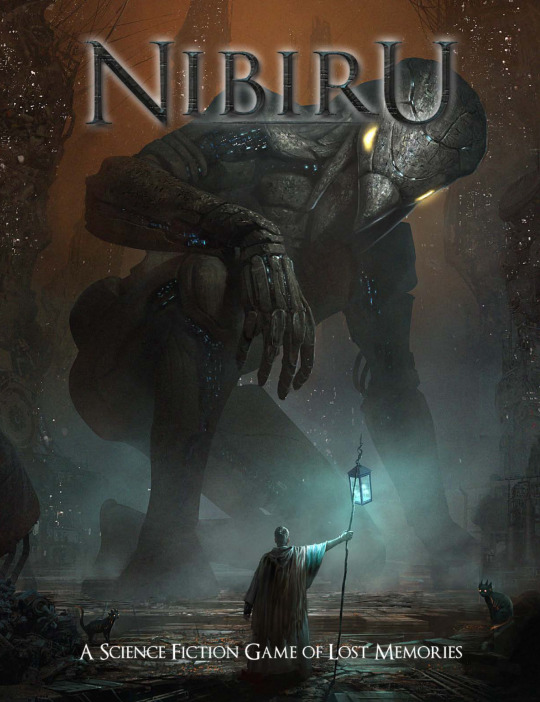
The Pitch
Nibiru is a game about amnesiac characters called Vagabonds, wandering a gigantic space-station habitat in a speculative future, trying to keep their identities a secret even while working to uncover pieces of their memories that they’re slowly starting to recover. It’s a unique game because you create your character backstory as you play, rather than inventing your backstory during character creation.
I find it hard to describe the setting of Nibiru, and I think that’s because there’s so much lore placed inside this game. The locations of the setting are divided into three sections: the Antumbra, The Penumbra, and The Umbra. The Antumbra is located in the centre of the space station, is the most easily habitable, and acts as a series of urban cityscapes, ripe for political intrigue and big social games. The Penumbra is a series of colonies, struggling to maintain control resources, and pushing back against the powerful, well-funded city states of the centre. The Umbra is the barely survivable borders, where gravity pressure, floods and blackouts constantly threaten your life, and small communities try to get by in a setting great for exploration and eerie adventures. Any given group is expected to find ample inspiration in just one of these areas; you certainly aren’t expected to explore the entire breadth of the station (although you can if you want to, of course. It’s your game).
Being a game about amnesiacs, character creation is rather simple. Because you are playing amnesiacs, you don’t have to select a skill list, but rather build your skills alongside your memories; every time you recall a memory, you either give yourself a negative modifier and earn Memory Points, or you spend previously earned Memory Points and give yourself a positive memory. But at the beginning, all you need to do is choose a habitat that carries themes that feel resonant to you, and think about how that might affect your character. However, the Habitats give you the core themes of what you want your character’s story to be about, and I think they’re very special.

The Habitats
There are five Habitats: The Machine, The Leviathan, The Dreadlands, The Dreamlands, and Brighttown. If you are from The Machine, you were some kind of robot or AI in your past life; at some point you gained sentience, and now you’ve awoken in a human body. If you are from The Leviathan, you were originally some kind of animal, driven by instinct; and while your body is different now, those instincts are still there. Dreadlands inhabitants suffer false recollections provided by a parasite called The Nightmare, which turns all of your skills into negative memories, but still shelters and protects you, and gives you plenty of chances to re-try something you’ve rolled poorly on. Dreamlands inhabitants do not collect one set of memories, but rather find themselves reliving periods of various other lives, of people that they meet as they go about the world. And finally, Brighttown players can play versions of themselves, dropped from the mundane world into an alien environment that still occasionally turns up artifacts of the world they came from; pieces of their old life continue to haunt them.
I played a two-shot of Nibiru over the past few months. I had four players for this game, each of whom picked a different habitat to play with. We didn’t have anyone to play the Leviathan habitat, but all of the others were represented. Our first session involved introducing the players to the system, while the characters woke up in a tank of water and found themselves meeting a small settlement that needed help sending aid to their neighbours. Our second session involved a voyage through a series of flooded corridors, dealing with hostile wildlife and suspicious patrols on their way to a hidden settlement built around a strange landmark. From a GM’s perspective, it was a simple delivery mission: get something from point A to point B, and deal with whatever obstacles pop up in front of you.

The Mechanics
This game only uses d4's. In order to do something in Nibiru, a character must make one of three rolls: a regular roll, a contested roll, or a special roll. A regular roll involves rolling 3 dice, adding or subtracting dice according to relevant modifiers, and looking for at least one 4. A result with at least one 4 is a success; a result with no 4’s and at least one 1 is a critical failure. A contested roll involves two players rolling 3 (or more) d4’s and adding them up. The highest total determines who wins out. Finally, a special roll is invoked by the GM whenever the character engages with a special mechanic of the game, either a Stress test, a Habitat mechanic, or some other special rule. Typically a 4 is good and a 1 is bad, but there can be more nuance, depending on what you’re rolling for.
Just from the two-shot, I could tell that Nibiru is more designed for the long haul. Character progression is slow, using two different kinds of experience points, and characters will level up only after filling a journal page with eight memories. Creating these memories is one way to spend these experience points, as well as a way to generate more. This encourages most players to switch between creating positive and negative memories, generating both positive and negative modifiers to any given roll. The biggest advancements happen at the end of the journal page, where characters write something called a Revelation - a special power that uses the second type of XP as a resource, to allow the players do something unique and powerful, such as experience premonitions of the future, or cry black tears that can be used as a poison. Over our two-session adventure, we got nowhere near receiving a Revelation.
That being said, we did play enough of a game to get a good taste of what I think is the most interesting thing about Nibiru - the memories.

The Memories
We began the game with an opening scene of each character pulling themselves from the water, gasping for air, and being confronted with their very first link or memory - something that established each characters’ expected tone. Our Machine character wanted to recall a series of disjointed recollections of the space-ship they were responsible for, and hint at the tragedy that caused them to lose the entire crew. Our Dreadlands character began a series of memories of things going wrong around her home; people arguing and breaking in, threatening those that she held dear. Our Dreamlands character began telling a series of stories about the man he woke up next to; following the confusing tangle of events of his life journeying through the Umbra, and our Brighttown character described to us a memory of something incredibly familiar: a movie theatre, and the ticket that came with them to this new, alien world.
These memories weren’t just establishing character backstory, they were giving the players a chance to build a history collaboratively, and build parts of the world. They also gave the players control over what kind of tone they wanted to set; a Dreadlands player that is consistently creating negative memories is setting a gritty undertone that contrasts the bright, but distant memories of Brighttown. The different themes of the habitats were also clear signposts: a Dreamlands player knows that at some point they might have to help the NPCs they meet reconcile with lost parts of their past, and the decisions they make about what parts to reveal and what parts to keep quiet about says something about who their character is - and how they judge the other people they meet in Nibiru.

The Letdown
My biggest letdown regarding Nibiru is not what it provides, but what it lacks: incentives for the characters to relate and depend on each-other. The players had no reason to turn to each-other while they were wrestling with their own personal emotions: I suppose thematically, they might have had a narrative reason to do so, but there was no mechanical prompt or reward.
It was rather easy to emotionally or physically isolate oneself from the group, working together when only you were in danger, but not sharing their memories or working through their lost paths together. In some games, like Thirsty Sword Lesbians, or Last Fleet, characters are drawn or pushed together, seeing each-other as resources or tools to use, but in either case forcing the characters to confront each-other’s vulnerabilities. Nibiru’s introspection makes for a rich character experience, but in isolation, and as a result it was more like telling four separate stories, than one cohesive one.

The Takeaway
One thing Nibiru reinforces for me is the fact that you don’t really need a backstory for a character in order to find them worth playing. And the themes introduced in Nibiru’s habitats have me thinking about how baking the themes of the game into the character backstory that you do have can tie your players more closely to the setting than otherwise. As amnesiacs, your characters have a solid reason not to know any of the lore, but the fact that the players know where their memories are coming from give them enough agency to hint towards the kind of stories they want to tell. Nibiru is a game about discovery: discovering who you are, and what the world around you is like.
Nibiru is also a game with plenty of space for tragic stories. Your character sheet has space for a number of symptoms that will start to affect your character should they take too much mental damage, and these symptoms can range from hearing voices to experiencing delusions. There's a lot about mental health and memory loss tied up in the mechanics of this game, which means that as a group you need to have a talk about what sorts of themes you're comfortable experiencing, and whether there's any consequences you need to avoid for safety reasons.
I think Nibiru has the potential to create a very emotional experience for your table, but I think that you have to play this game with folks who you can expect to naturally turn to each-other even as they introspect. Mechanically, it's beginner friendly, but when it comes to role-play, it demands a level of vulnerability that I'm not sure every table wants to have.
You can check out my spreadsheet play-kit for Nibiru here.
83 notes
·
View notes
Text
And people keep trying to justify Israel's existence on the basis that it is somehow a safe place for the preservation of Jewish people and their culture and not only is that an awful argument for establishing a Settler Colonist Apartheid State but it's not even true. Like the state is politically and economically dominated by Ashkenazi Jews from Northern Europe and their descendants. While not as severely mistreated as Palestinians, there is still a significant disparity between the European and Non-European Jews in terms of income and education. Non-European Jews are still regularly subject to interpersonal bigotry (hell earlier this year there was a news story about a viral video where Ashkenazi girls in a Purim made a skit mocking the Mizrahi) and Israel government policies towards non-Ashkenazi migrants have done severe damage to their social structure and cultural traditions. Not to mention the fact that the whole reason why many Mizrahi migrated in the first place was to escape the violence caused by European Jews committing atrocities in their name, tearing communities apart as neighbours that had peacefully co-existed for centuries found themselves on opposite sides of this new ethno-religious conflict
There have even been attempts in Israeli history at the forceful assimilation or even biological reduction of non-European Jews; the kidnapping and adoption of Yemeni Jewish children in the 1950s is significant example of the former while the forced contraception of Beta Israeli (Ethiopean Jewish migrants) with the explicit intention of reducing their population's birth rate is an example of the latter. There's also very clear favouritism when it comes to recent converts; white Afrikaner converts are given the right of Aliyah while Nigerian Igbos are not. Like the fact of the matter is that Israel's fundamental nature is as a European Settler Colony, incredibly racist not only towards the indigenous Palestinians but the many Non-European Jews it claims to represent. It's an outpost of Western Imperialism, not a haven for the Jewish people. If it was ever meant to be the latter than it has failed miserably
6K notes
·
View notes
Text

Baalbek, Lebanon - WORLD HERITAGE
Baalbek, which has traces of settlement since 9000 years, was one of the cornerstones of ancient civilizations. The famous Baalbek temple complex in Heliopolis, Lebanon, is one of the largest Roman religious sites in the world and part of the World Heritage Site.
In ancient times it was a Phoenician sanctuary, a Greek city and from the time of the Seleucids it was called Heliopolis, and it was a Roman colony since Augustus. It is one of the most important archaeological sites in the Near East. It is notable for an area of Roman temples from the 1st to the 3rd century.


The sanctuary was part of the Colonia Iulia Augusta Felix Beritus, now Beirut. The Temple of Jupiter was completed in the year 60 during the reign of Nero (54-68). The construction of the great courtyard was carried out during the reign of Trajan (98-117). Under Antoninus Pius (138-161) the Temple of Bacchus was built. The work on the Temple of Venus was completed during the Severan dynasty, particularly during the reign of Caracalla (211-217). Under Philip the Arab (244-249), Roman Emperor of neighbouring Damascus, the hexagonal courtyard of the sanctuary was built.

UNESCO has already warned of the danger site faces due to current conflicts.

"UNESCO to meet on November 18 to call for strengthened protection of Lebanese heritage" announced L'Orient Le Jour.
@ancientcharm
92 notes
·
View notes